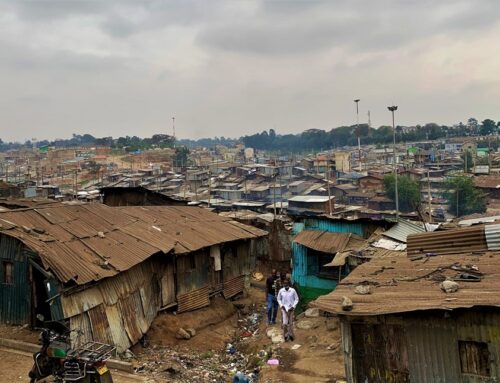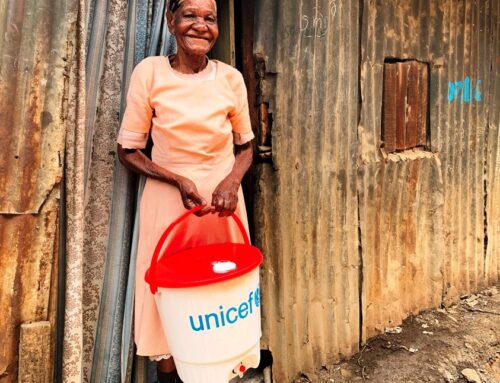Highlight: WASH First, a 15 months project funded by Simavi and implemented by WASH Alliance Kenya, installed 20 water tanks, 20 handwashing stands and distributed menstrual health management kits to 825 girls in 15 schools in Nairobi’s Korogocho and Mathare Valley informal settlements.
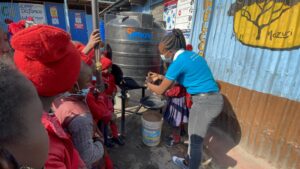
The advent of the COVID-19 pandemic in early 2020 was a big blow to people living in the informal settlements around Nairobi, more so school-going children in institutions within these areas.
Apart from the lack of proper sanitation, schools in informal settlements do not have a constant water supply and cannot afford to buy soap for the entire population to help them support frequent handwashing.
Safeguards measures set by the government to stop the spread of COVID-19 in Kenya have been difficult to adhere to in the informal settlement
s where people have to choose between working in risky places in order to afford basics like food and rent and protecting themselves against the deadly viral disease.
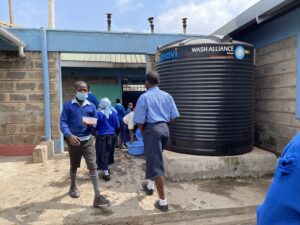
“The biggest challenge that we had in Mathare was sanitation. Getting clean water is a problem in Mathare,” said Dickson Odhiambo Waga, headteacher Destiny Community Education Centre in Mathare Valley informal settlement.
Waga’s school, with some 364 pupils, was one of the schools that closed for nine months when COVID-19 was discovered in Kenya. Schools across the country started partial opening in October 2020.
Through funding from Simavi, WASH Alliance Kenya implemented the WASH First project, which aimed to improve access to handwashing in schools and households in informal settlements. This was achieved by installing water tanks and handwashing stations in schools and distributing the handwashing vessels and soap to vulnerable households
“When we opened schools we didn’t have reliable water and we didn’t have anywhere to store our water and we also did not have soap. Sanitation was very poor at Destiny,” Waga said.
“When WASH Alliance and Simavi came to our support, it really helped us get the tank that boosted our water reserves. Sanitation has improved and the pupils are able to wash their hands without any worry of lacking water or soap.”
MHM
The project also supplied girls in the targeted schools with over 825 menstrual management kits that included reusable pads and inner pants for the girls to wear during their periods.
These supplies helped them stay in school and avoid cases where girls whose families cannot afford to buy them sanitary pads end up using unhygienic alternatives or have sex with men in the community so as to be bought pads.
“We thanks WASH Alliance Kenya for the sanitary pads. They have been of great help,” said Dorcas Masila, headteacher Daniel Comboni Primary School in Korogocho informal settlement that has over 1200 students.
“Initially we used to have absenteeism especially when our girls have the monthly period they would miss classes because of fear. Since WASH Alliance gave us these pads, the problem
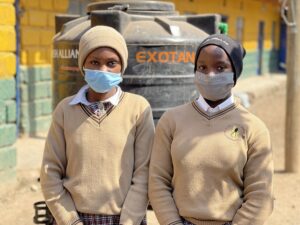
of absenteeism has reduced.”
Sophia Atieno, a 13-year-old grade seven pupil at The Shelter Centre in Kisumu Ndogo, Korogocho, said she could not access sanitary pads at home because her parents were unable to afford any, but the WASH Alliance Kenya donation made it easier for her to attend school consistently.
“I’m not the only one in our house that has menstrual health needs and our parents cannot afford to provide for all of us. Sometimes I used to wonder what I will wear. I’d even use tissue,”
“When this WASH Alliance program came it really helped me as a girl and my fellow pupils. We didn’t have to struggle with absenteeism, we didn’t have to be shy when with boys, or when talking to male teachers.”


